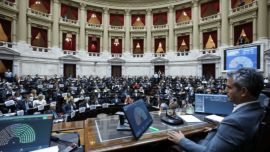Nationalising a river running through five countries in the name of “hydric sovereignty” should be an oxymoron, but nevertheless it happened last week. State control over the Hidrovía Paraná-Paraguay waterway has been decreed for the next year at least, but the temporary has the nasty habit of becoming permanent in Argentina. The fact that this waterway’s title includes the name of a neighbouring republic already casts doubts over the nationalistic sovereignty concepts behind this state intervention but nor do these have much of a federal dimension – most or even all of the riverside provinces have serious misgivings about the national takeover potentially clogging what they see as a main artery of their economic lifeblood.
Nor is this aggressive move out of context – only the previous weekend the government had nationalised freight railways. This advance prompted renewed criticisms of a “standalone” government which only the previous week had lost the confidence of the outside world with a steep downgrading. Yet seen in isolation this renationalisation was no real cause for alarm – state entry here was virtually by default since the previous Mauricio Macri administration had run the privatisation banner up the flagpole (especially for the Belgrano line) and nobody in the private sector saluted. As with the Paraná waterway, state control is announced as temporary – a transition towards hybrid ownership along the lines of the mixed economy – and in this case at least the intention seems sincerer.
But the alarm bells are far more justified with the Hidrovía, not least because around 80 percent of the country’s foreign trade flows down it, whereas rail freight is a marginal factor with overland transportation largely in the grip of the teamsters. If rail freight is more a case of little to gain or lose with nationalisation, the risks are much higher with a waterway channelling the bulk of the country’s vital export revenues – risks sufficient to give pause to the government’s moderate sectors, which earlier this year had rolled over for three months any change in the Hidrovía’s current administration (a Belgian dredging company with a local partner). But in the heat of an escalating midterm election campaign the Kirchnerite wing has seized control invoking a nationalist ideology shrouding fiscal greed – the argument that nationalisation is necessary to counter contraband is entirely spurious because both the Coast Guard and Customs are already at hand to enforce state control.
Simplifying in the extreme Hidrovía management, it has until now basically consisted of keeping the waterway going through extremely costly and complex dredging operations financed by a fee of around US$3.40 per ton of cargo (totalling some 120 million tons). The idea of the latter as a new cash cow is extremely attractive to Kirchnerism – the big worry is that this money will be redirected to political slush funds, trimming the fiscal deficit, pandemic social assistance or indeed almost anything except the dredging so vital to keep the waterway going. A challenge greater than ever, with the Paraná approaching its lowest depths in history in this generally dry year (less than a metre deep in the vicinity of Rosario).
Any confidence as to a state deep in the red, with a long record of loss-making public ownership and denied overseas credit being up to this challenge is almost totally lacking. At least two possible outcomes here. One is that cash flow will outweigh all other considerations with the state refusing to relax its grip on a waterway denied the investments to save this artery from increasing clots. And the other is that the government is sincere in saying that state control will be temporary (if only because it has no other choice) and that administration of the waterway will eventually return to external hands – with the huge difference that the Belgians stand to be replaced by Shanghai Dredging. In the name of sovereignty an increasing handover of the country to the Chinese superpower could thus be underway.
The future of the waterway is thus up in the air (to mix metaphors) but last week’s moves against both rail freight and the Hidrovía show the general trend to be unmistakable – if this government has declared such a dynamic sector of the 21st century as telecommunications to be a public service (another Chinese advance underway here?) in the name of a 19th century nationalism, what doubts can there be about an omnipresent state invading all areas of the economy? The opposition talks a lot about defending republican institutions but surely this front is equally important.


















Comments